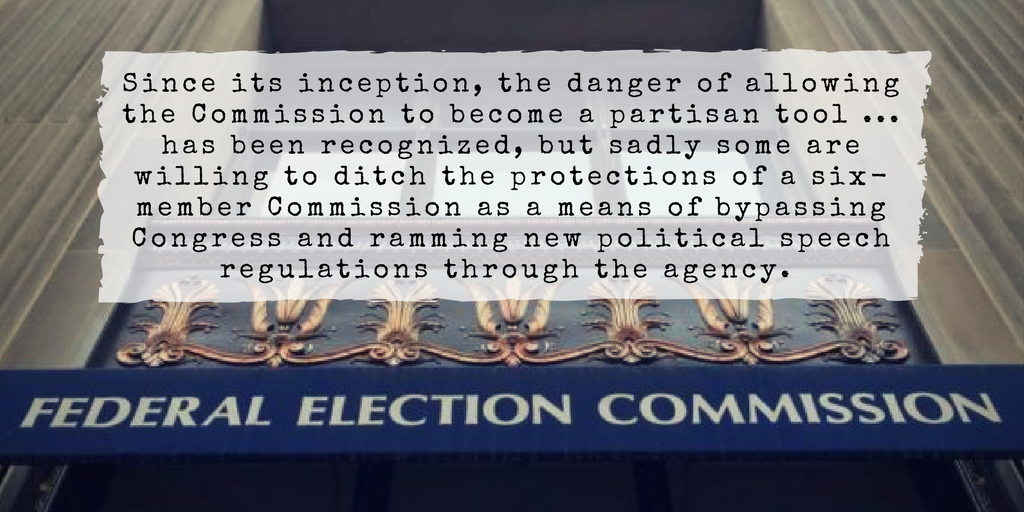The term “Orwellian”, which has come to embrace a number of different definitions, sometimes crops up in the campaign finance debate. Because campaign finance regulations intrude on personal liberty, the term is sometimes used in the familiar “Big Brother” sense:
“Attention all citizens. To assure the fairness of elections by preventing disproportionate expression of the views of any single powerful group, your Government has decided that the following associations of persons shall be prohibited from speaking or writing in support of any candidate: .” In permitting Michigan to make private corporations the first object of this Orwellian announcement, the Court today endorses the principle that too much speech is an evil that the democratic majority can proscribe.
Austin v. Mich. State Chamber of Commerce, 494 U.S. 652, 669 (1990) (Scalia, J., dissenting).
While discussing the McCain Feingold electioneering communication prohibitions (BCRA § 203), Justice Kennedy used the term in a different sense:
We are supposed to find comfort in the knowledge that the ad is banned under §203 only if it is targeted to the relevant electorate, defined as communications that can be received by 50,000 or more persons in the candidate’s district. This Orwellian criterion, however, is analogous to a law, unconstitutional under any known First Amendment theory, that would allow a speaker to say anything he chooses, so long as his intended audience could not hear him.
McConnell v. FEC, 540 U.S. 93, 335 (2003) (Kennedy, J., concurring in part and dissenting in part) (internal citations omitted).
Kennedy’s use of the term alludes to Orwell’s concept of “doublethink”, the ability to hold two contradictory beliefs simultaneously. Another example of doublethink can be found in reformers who invoke the mantra that “money isn’t speech” but see no contradiction in also holding that speech is money. An even clearer example can be found in a recent editorial by Geoffrey Stone, professor of law at the University of Chicago. In his editorial, Prof. Stone offers 10 propositions that he believes define modern political liberalism. Included on the list were the following two propositions:
1. Liberals believe individuals should doubt their own truths and consider fairly and open-mindedly the truths of others. This is at the very hert of liberalism. Liberals understand, as Justice Oliver Wendell Holmes once observed, that “time has upset many fighting faiths.” Liberals are skeptical of censorship and celebrate free and open debate.
3. Liberals believe individuals have a right and a responsibility to participate in public debate. It is liberals who have championed and continue to champion expansion of the franchise; the elimination of obstacles to voting; “one person, one vote;” limits on partisan gerrymandering; campaign-finance reform; and a more vibrant freedom of speech. They believe, with Justice Louis Brandeis, that “the greatest menace to freedom is an inert people.”
Prof. Stone admits that some of the items on his list are in conflict which, almost by definition, means that he is not personally guilty of doublethink; but true doublethinkers see no conflict at all between “campaign finance reform” and “vibrant freedom of speech” (we, of course, are happy to point it out for them).
Finally, there is a third definition of “Orwellian” that aptly describes the tactics taken by some “reformers”: the manipulation of language, particularly through obfuscation, to advance political objectives. This definition is embodied in the very phrase “campaign finance reform”. As John Samples notes:
Campaign finance reform, the most common term used in the debates, means “restricting money in politics,” especially contributions to public officials. [Reform] means “a change for the better; an improvement” and “correction of evils, abuses, and errors.” By getting everyone to talk about campaign finance reform, the reformers win the debates by definition rather than by argument because restrictions on campaign finance are identified with abolishing abuses and error. I believe we should assess existing or proposed restrictions on money in politics on their merits.…We ought not to bias that investigation and analysis by calling such restrictions reform.
John Samples, The Fallacy of Campaign Finance Reform 13 (2006).
Regardless of one’s preferred definition, these examples illustrate that “reform” is often intrusive, its logic is marked by contradictions, and its language is deliberately opaque. “Orwellian” seems an apt description.














